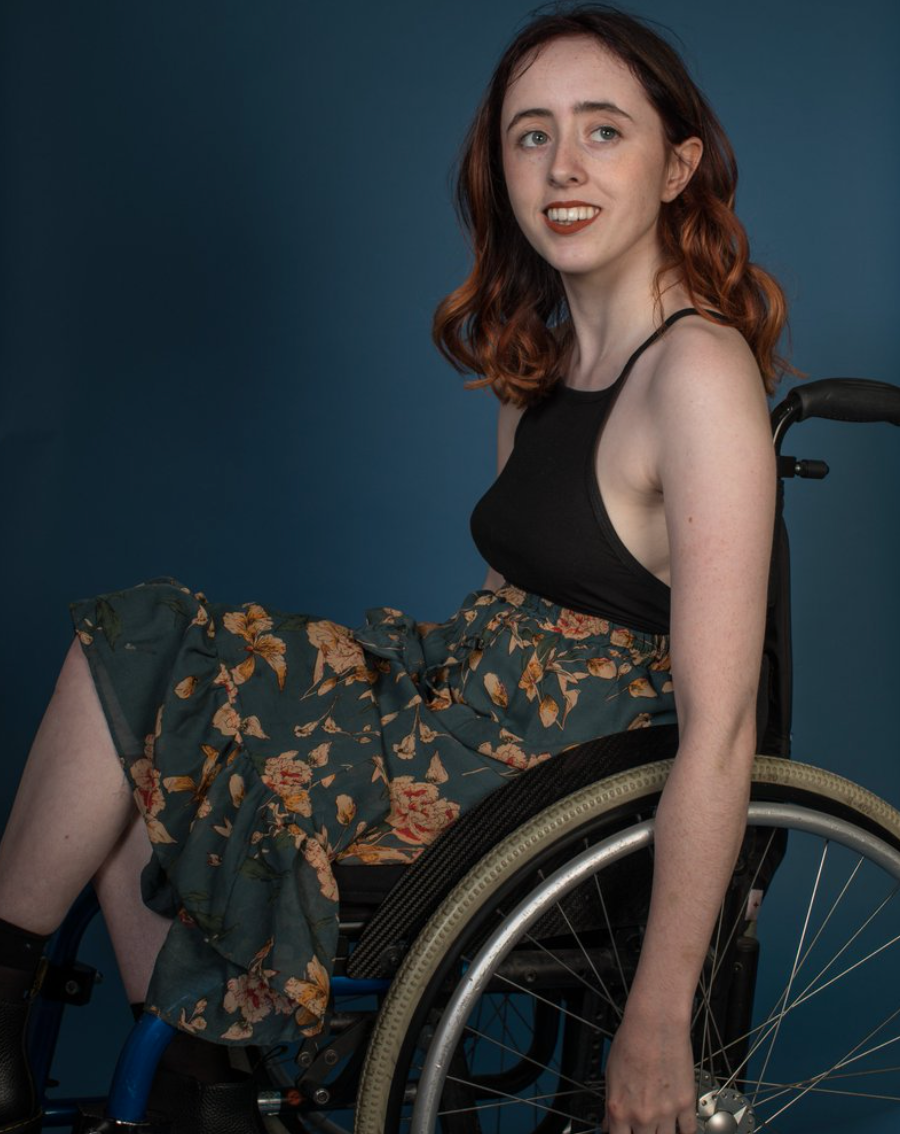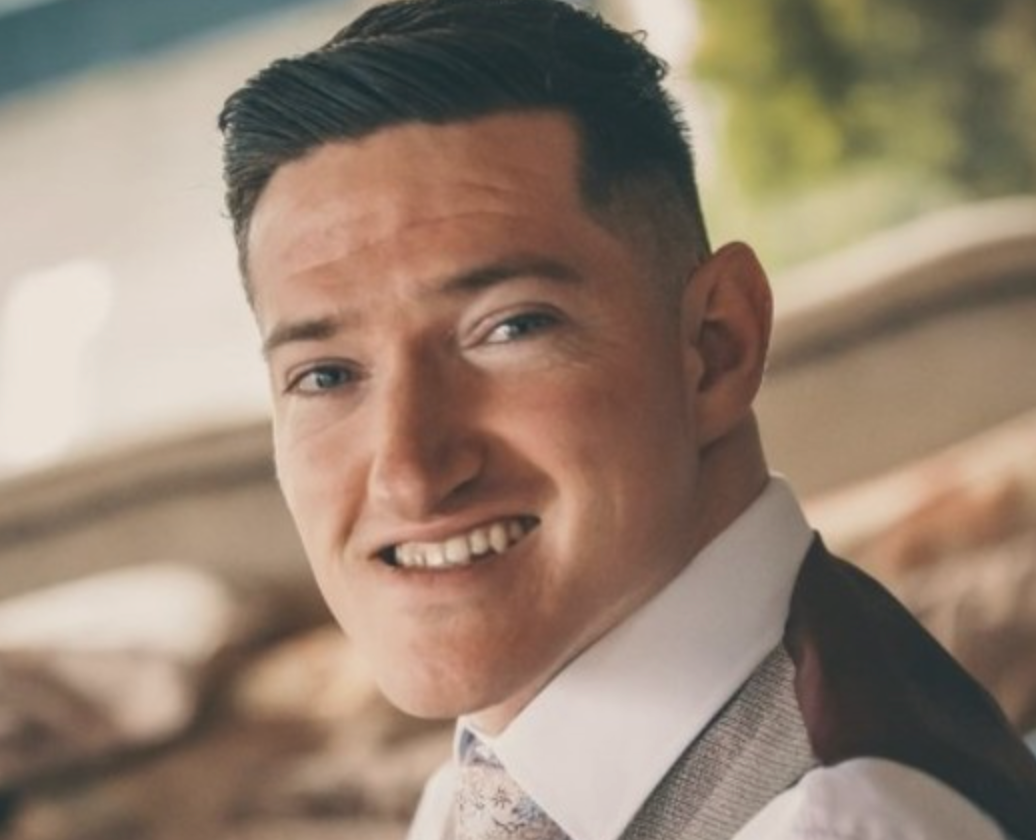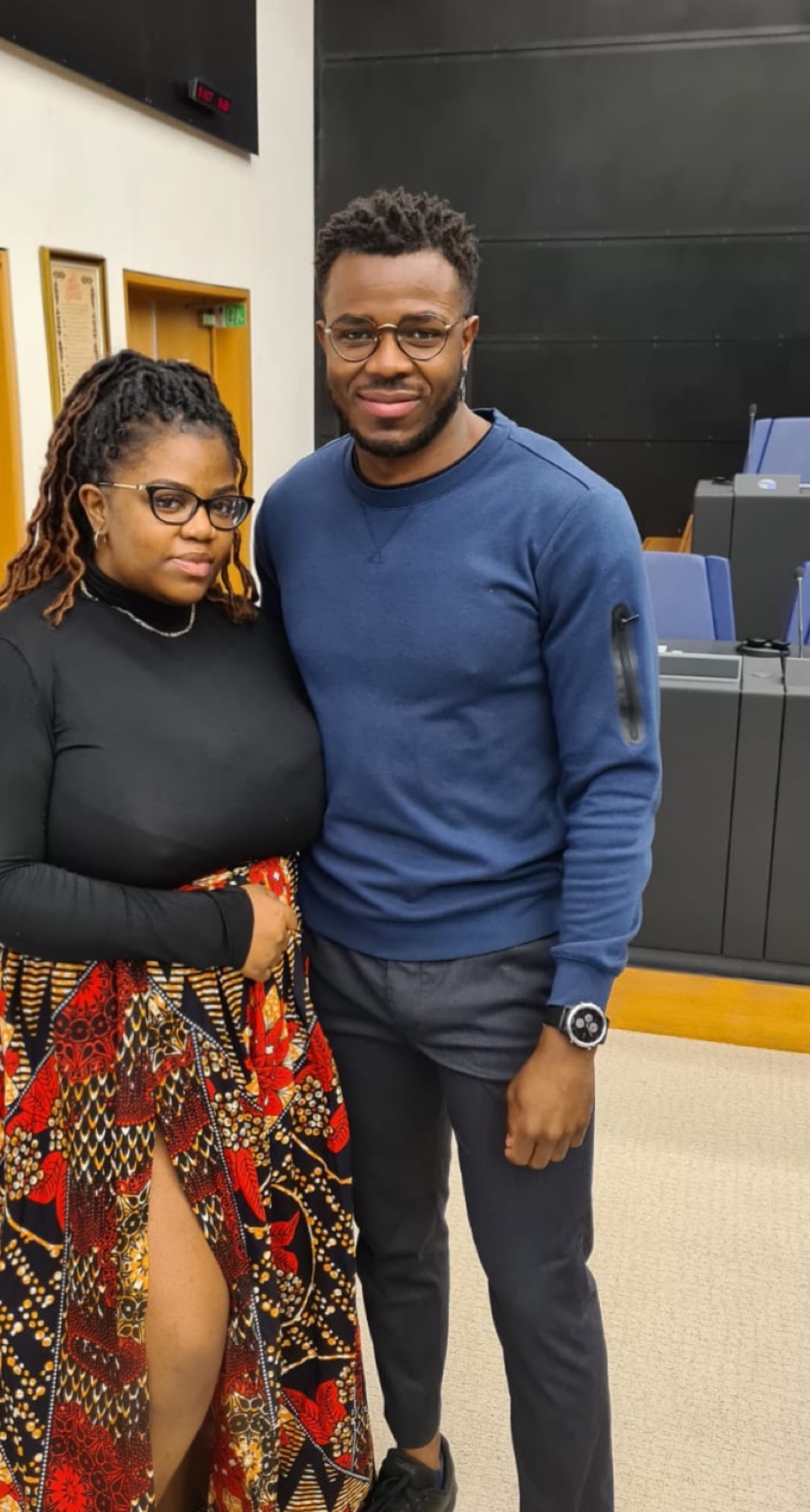- Lifestyle & Sports
- 01 Dec 21

'Able-bodied people making all of the decisions around climate means they neglect to consider the needs of a seventh of the world's population'. Hot Press speak to ILMI policy officer James Cawley, deaf activists Lydia Gratis & Romel Belcher and journalist/disability advocate Niamh Ní Hoireabhaird on their responses to COP26 and recommendations for the future of disability rights.
Time and time again, world leaders fail to include marginalised groups at the metaphorical 'table' when making life-altering decisions that predominantly affect the absent parties.
Understanding the systemic inequities that create barriers to accessibility for the disability community, such as eco-ableism and lack of inclusion in policymaking, is pivotal to enact impactful change. Social and economic factors affect which countries and communities are hit hardest and require the most humanitarian aid, with a December 2019 letter published in Science magazine specifically raising concern about climate change and the disabled community.
The UN flagship report on disability and development highlights that disabled people (disabled youth especially) are lagging behind the norm in access to undergraduate education. Compromised health means that disabled people are more vulnerable to extreme climate events, ecosystem services loss, or infectious diseases. For example, Hurricane Katrina disproportionately impacted 155,000 people with disabilities. In devastating events like hurricanes, floods and cyclones, disabled people - because of limited mobility or impaired senses - might have difficulty evacuating. These three factors and more should emphasise the value of having people with disabilities at the forefront of the climate conversation, considering the inherent dangers.
Able-bodied politicians, often with shaky records in relation to investment in fossil fuel companies and voting in favour of beneficial environmental policies, are at the forefront of the climate response. Unfortunately, the recent COP26 conference was no exception, seeing civil society locked out of all negotiations.
By now, you've probably heard about the lines, access and representation issues at #COP26. But it's been a really awkward, strange day, so I want to lay everything out here, because if you've wondered if #COP26 is okay, I'm gonna show you that no, #COP26 is really not okay/1
— Alexandria Villaseñor 🌈 (@AlexandriaV2005) November 3, 2021
Advertisement
The Glasgow-set summit was host to a slew of complaints and problems from the outset. Israeli delegate Karine Elharrar was forced to return to her hotel 50 miles away on Monday after waiting outside the COP26 conference for two hours. Boris Johnson and the UK's environment minister both apologised and called the incident - which coincided with Purple Tuesday, an awareness day for disability rights - a "learning opportunity".
Tweeting about her experience, Minister Elharrar said: “I came to COP26 to meet with my counterparts around the world and promote a common struggle in the climate crisis. It is sad that the UN, which promotes accessibility for people with disabilities, in 2021, does not provide accessibility to its events. Hopefully the lessons learned will be learned so that tomorrow green energy promotion, removal of barriers and energy efficiency will be the things I will deal with.”
Allegations of racial profiling of youth delegates were also made public, as well as the revelation that zero sign language interpreters were present throughout the entire conference. Hot Press have since decided to discuss the matter with some of Ireland's disability experts and advocates. James Cawley, Lydia Gratis, Romel Belcher and Niamh Ní Hoireabhaird delve into their immediate responses to COP26 and their recommendations for the future of disability rights.
Niamh Ní Hoireabhaird - journalist, activist and disability advocate

"I was saddened but not surprised when I heard about the issues with COP26," Niamh tells Hot Press. "The climate movement has neglected to take into account disability time and time again, so the most important climate event on the calendar being inaccessible came as no shock to me and many others in the disability community."
Advertisement
"The UN estimates that there are one billion people with disabilities throughout the world, and that these are the people most affected by severe climate events like floods and extreme temperature change," Niamh continues. "Able-bodied people making all of the decisions means that they neglect to consider the needs of a seventh of the world's population. Although the aforementioned incident at COP26 was unfortunate and completely avoidable, I hope that it can serve as a learning opportunity for everyone - not only climate activists - that they need to do better and be more inclusive."
Climate change is a disability rights issue when viewed through a humanitarian lens, Niamh highlights.
"It's important for people to take on the task of educating themselves about disability issues," Ní Hoireabhaird stresses. "This can be done in loads of different ways - there's so much information out there on Youtube, Twitter, Instagram and on different blogs. The only way to learn about disability issues is by listening to disabled people about their experiences and opinions. I wish that government leaders did this before implementing legislation that impacts the lives of people with disabilities."
James Cawley - Independent Living Movement Ireland (ILMI)

James, as a policy officer with Independent Living Movement Ireland (ILMI), has long acted as a human rights activist. The rural Longford native emphasises his identity not just as "a proud Disabled man", but also as "a son, brother, husband, friend, co-worker and advocate."
ILMI are a campaigning, national Disabled Person’s Organisation led by and for disabled people. The organisation that promotes the philosophy of independent living and seeks to build an inclusive society, which is pivotal to the issue of climate equality. The right to safe housing goes hand-in-hand with climate justice.
Advertisement
Central to the way the ILMI is to ensure that policy decisions that impact on the lives of disabled people must be directly influenced by those whose lives are directly affected.
"Our philosophy can be summed up as: ‘Nothing about us without us!’ and ‘Rights Not Charity’. Our vision is an Ireland where disabled persons have freedom, choice and control over all aspects of their lives and can fully participate in an inclusive society as equals," James tells me.
The social model examines how society is structured, and therefore how it disables people. It is not based on a person’s impairment, instead it focuses on the barriers that exist in terms of attitudes, policy development, access or lack of supports that prevent people from participating in society as equals. James sees the COP26 conference as a classic example of how an institution or part of society itself disables fellow citizens.
"To be honest personally, I’m not surprised. Several disabled people have went to 'accessible' events or venues and then they simply are not when they arrive," Cawley explains. "Often they are partially accessible where you can get into the building but there may not be an accessible bathroom that you can turn your wheelchair in – they are often accessible on paper or in policy but not practically accessible in real life."
"Often I believe this exclusion or inaccessibility comes from not engaging with disabled people from the start of the process. If they did, we wouldn’t be having this conversation. Disabled people are experts by lived experience – ask us, don’t talk about us."
"Also, I don’t think there is any place for these excuses anymore," James continues, fervently. "We should be organising events and designing products and services with diversity in mind. While a wheelchair user’s impairment is quite visible and their access requirements might be a ramp or level access or assistance by a personal assistant. Another person’s access requirements might be an interpreter. Inaccessibility is often thought about as that ramp or that step but it's about much more than just physical access. Information, communication and designing for diversity and for all are pivotal."
Article 29 of the UN Convention on the Rights of Persons with Disabilities (CRPD) is crystal clear about disabled people having the same rights as others to take part in political and public life.
Advertisement
James recommends that all government departments should engage more with disabled people and their organisations specifically, consulting in all policy discussions. 7.5% of all new social housing and housing provided by approved housing bodies must be ring-fenced for disabled people. Vitally a central, uniform, accessible application process for housing and independent living supports must be established.
"We need to invest in a fully accessible transport system, which connects disabled people and enables us to be included in the community," James emphasises. "This in turn will reduce our carbon emissions. Climate change is a challenge but could disproportionately impact on disabled people if carbon taxes are introduced for example. Costs of heating a house will go up, fuel costs will rise and we know disabled people experience a 'cost' of having an impairment already."
There is a noticeably lack of disabled people representing their communities as TDs, Senators and Ministers in the Oireachtas. According to James, some of the reasons for this include lack of promotion, information and communication as well as the lack of resources for disabled people to canvass, access transport and get adequate Personal Assistant hours to engage in public and political life.
"Representation of disabled people needs to be broadened and it needs to be seen at every level local, regional and national," Hawley adds. "It must be from the top down and the bottom up. Education is a good instrument and way to ensure that there is a push for politics. This will allow disabled people to avail of vacancies in local structures. We often feel that being a disabled person can be seen often as your expertise. The intersectionality of the person is not often reflected."
"Societal attitudes and stereotypes and ableism is a big issue. Disabled people need capacity building to support development into political life and consultation needs to be meaningful rather than box ticking."
Lydia Gratis & Romel Belcher, activists within Ireland's deaf community

Advertisement
COP26 included zero sign language interpreters, leaving the deaf community completely neglected. According to Lydia Gratis, "lack of access in one's language to vital events like these are human rights violations".
"It's absolutely catastrophic. Deaf people and sign language users all over the globe should feel that they also are a priority and should be included in the debate to fight climate change," Gratis tells Hot Press. Romel Belcher, a fellow deaf activist, adds his expert analysis to the subject alongside Lydia.
"Disability rights are human rights. Everyone deserves to be included and live a full accessible live in public spaces, education, work, home and anyone else. The lack of access points us to a wider issue, showing us how deaf and disabled people aren't expected or encouraged to be leaders in society. The responsibility being placed on us to ask for access is hypocritical from those we call 'world leaders'."
Lydia is an advocate for the inclusion and understanding of deaf people in Irish society and in the hearing world, with the 27-year-old maintaining a vital connection to the fight for climate justice.
"Accessibility is necessary for everyone who walks on the globe. Climate change concerns us all. That includes deaf and disabled people. Deaf people are also fighting for out rights to safe accessible environments and for the the upcoming generations, thus not providing sign language interpreters in International Sign Language shows that world leaders and especially the UK Government lack the representation needed to address such issues, let alone anti-ableist knowledge."
"It is a matter of lack of representations of the diverse needs of different groups of people. Conferences all over the world need to understand that all kinds of people are involved when it comes to matters of climate and global justice. We can't offer a seat at the table only to those who fit the 'norm'."
There were also reports of Black and Brown youth members being profiled and removed from the COP26 venue, does this shock you?
Advertisement
"It is safe to say nothing shocks us at this point," Gratis and Belcher concede. "Black and Brown youth activists being erased in the fight for climate justice isn’t a new occurrence. We have the media cropping out Black people like Vanessa Nakate out of pictures and not taking or naming them at all. This isn’t accidental; it's their implicit biases rearing their heads as usual."
"All over the world we see the challenge to address racism and racial profiling of Black and Brown bodies. This is something the white, Western world has shown its lack of will to face what has been a global pandemic for many years. In the wake of the current pandemic we have seen the ignorant act of the trying to undermine the fact that racism and racial profiling is a global problem, especially with people using COVID-19 as a way address the rise in racism 'lately'. It isn't that racism has risen, its that white people are just paying a little more attention to Black and Brown voices and started to notice the racism we’ve always seen."
If members of these communities were involved in high positions of planning such crucial climate events, racial profiling would have been brought up as a discussion about implicit biases.
"We believe there is a need to include people who live in the most vulnerable parts of the world affected by climate change. Countries in the western world and countries with great economies, lack the understanding of how their political and economic decisions affect the world and how detrimental lack of representation can be for those who are the utmost victims of climate injustice."
What can we do to make sure disabled people are included in this fight?
"There needs to be more representation on all boards and planning committees. Diversity in CEO positions and Diversity in the media. Representation means problems and lack of access or inclusion can be detected from early on. The world has over 200 different sign languages but major conferences need to hire international sign language interpreters specifically," Lydia and Romel affirm.
"There is a quote we love that says, 'Diversity is having a seat at the table, inclusion is having a voice, and belonging is having that voice be heard'."










